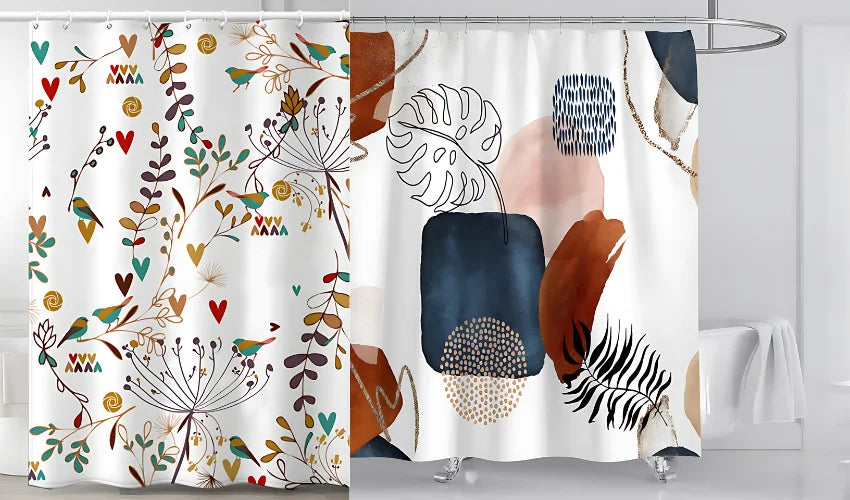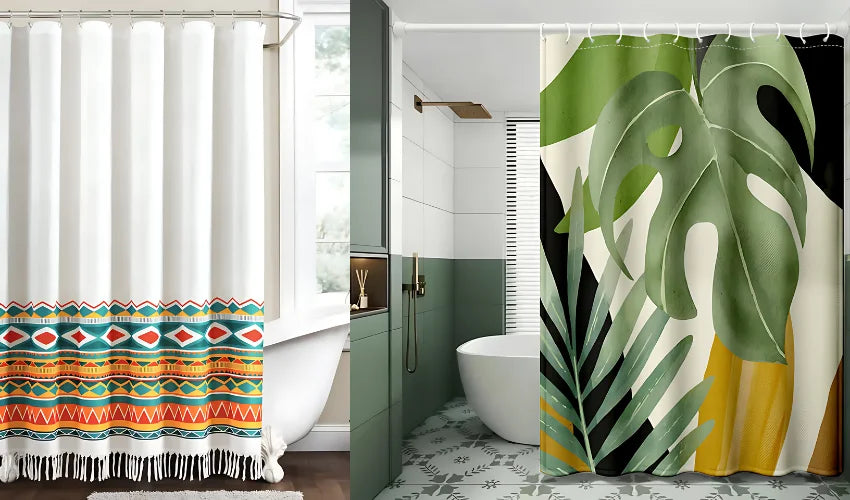The standard size of common shower curtains is 72" x 72". This size provides enough coverage area. It can fit perfectly in most home bathrooms.
If you are still on the fence about buying a shower curtain? What size shower curtain to buy? Then let me tell you that you should definitely buy a shower curtain, but the size of the shower curtain will depend on the style you want before deciding. In this article, we will answer why you should buy a shower curtain, how to determine the size of a shower curtain, and what styles will be available in different sizes.
Why Do I Need a Shower Curtain?
Why did I buy a shower curtain? When I didn't have a shower curtain, my bathroom was full of water after every wash. He was going to take me at least 20 minutes to clean it up. To make matters worse, the wet bathroom made me fall, so I wanted to change that.
From what I can tell, a shower curtain will fulfill my basic needs, here are the basic features of a shower curtain:
- Splash-proof: Shower curtains block water splashes during bathing, preventing water from splashing out of the bathtub or shower area and keeping the rest of the bathroom dry.
- Protects Privacy: Shower curtains create a private space.
- Prevent Mold: Shower curtains reduce the risk of mold and mildew growth by reducing moisture on walls and floors.
- Decorative: Shower curtains come in a variety of colors, patterns, and materials, and can be changed to change the style and ambiance of your bathroom.

What Sizes Do Shower Curtains Come In?
As far as I know, everyone has a different opinion about the size of bathroom shower curtains. Below, I will combine other people's opinions and my own practical experience to give you an overview of the differences between different sizes.
Standard Size
70 x 70 Inches
this size is a common standard size that provides basic splash protection and privacy.
70 x 72 Inches
slightly longer than 70 x 70 inches for better splash protection. The extra length covers the lower half of the shower area.
72 x 72 Inches
this is the most common standard size and is usually considered to provide the best coverage area. Fits most standard-sized tub and shower spaces.
Special Size
54 x 78 Inches
This size is suitable for smaller shower spaces and walk-in showers. The longer length (78 inches) prevents water from splashing onto the floor.
70 x 84 Inches or 72 x 84 Inches
This size is an extra tall curtain size. Ideal for shower spaces with additional height requirements.
144 x 72 Inches
This is the extra wide curtain size. Suitable for wide shower spaces or non-standard width tubs.
If you want to buy a shower curtain click on this link:https://uk.ownkoti.com/collections/shower-curtains.Ownkoti's shower curtains come in these sizes, so you can refer to the sizes above and choose the size you want.
- 35"W x 71"L (90cm x 180cm)
- 47"W x 71"L (120cm x 180cm)
- 59"W x 71"L (150cm x 180cm)
- 71"W x 71"L (180cm x 180cm)
- 71"W x 79"L (180cm x 200cm)
- 71"W x 90"L (180cm x 230cm)
- 79"W x 79"L (200cm x 200cm)
- 79"W x 90"L (200cm x 230cm)
How am I Going to Measure my Bathroom?
To choose the right shower curtain for your bathroom, you first need to accurately measure the dimensions of your bathroom, here are some specific steps for measuring your bathroom:
Tools you'll need
- Measuring tape
- Pen and paper
Measuring Procedure for Shower Curtains
Step 1: Measure the Width
Measure the width of the shower stall
- Use a tape measure to measure from one wall to the other.
- Add 12 inches (about 30 cm) to the measurement.
This will ensure that the shower curtain is wide enough to fold easily when in use, rather than being tight, which not only looks better but also prevents water from splashing out of the sides.
Choose the right width
Standard shower curtain widths are usually 72 inches and 84 inches. Choose a standard size that is closest to the "measured width + 12 inches" result.
Step 2: Measure the Height
Height from shower rod to floor
- Measure the straight line distance from the top of the shower rod to the floor.
- If you plan to use a hanging loop (non-built-in type), subtract 8 to 10 inches from the measurement.
This step is to take into account the space for the hanging ring and to ensure that the bottom of the shower curtain does not drag on the floor, avoiding water and stains on the curtain.
Select the proper length
The standard shower curtain length is 72 inches; for longer tubs or showers, an 84-inch curtain may be needed. Choose based on your "rod to the floor - 8 to 10 inches" measurement.
Step 3: Record the Measurements
Make a note of the measurements. This will be the size you refer to when shopping for a shower curtain.
Step 4: Add Lining and Accessories
Select a liner
The liner should be the same size as the shower curtain or one to two inches smaller. The liner will help protect the shower curtain from direct water contact.
Hooks and other accessories
- Roller hooks are recommended to ensure that the shower curtain moves easily on the rod.
- Recognize the buttonhole configuration at the top of the panel for attaching the hooks. Standard-size panels usually have 12 to 15 button holes.
These are the steps to measure a shower curtain. Hopefully, it can give you a little reference.

Why is the Size of the Shower Curtain Important?
Just like buying clothes, they are only comfortable and beautiful to wear if they are the right size.
My bathtub is a standard size, about 60 inches long. I didn't know how to choose the size of shower curtain to fit, so I bought three sizes of shower curtains 54 x 78 inches, 72 x 72 inches, and 72 x 84 inches. I'll tell you about the problems I had choosing the size of my shower curtain.
- Leakage: Shower curtains are too short or too narrow to effectively keep water out. This leads to slippery floors, which over time can lead to peeling paint, warped floors, and mold growth.
- Unsafe: Shower curtains that are too long can pile up on the floor and trip you if you're not paying attention.
- Unsightly: shower curtains that are too short don't reach the floor and those that are too long pile up on the floor. The bathroom looks incomplete or uncoordinated.
- Inconvenient: a shower curtain that is too large can interfere with other fixtures and features in the bathroom. It can get stuck on items such as door knobs, towel racks, and even toilets.
If you don't choose the right size of shower curtain, it may be the same with a shower curtain as without one, and you may even find it less convenient than without one.
Other Questions About Shower Curtains
Here are questions from other users who have used the shower curtain.
What Types of Shower Curtains are Available?
- Plastic shower curtain: easy to clean, good waterproof effect, economical price.
- Fabric shower curtain: beautiful and comfortable, strong water absorption, needs to be lined.
- Anti-mold shower curtain: special material, that inhibits the growth of mold, simple maintenance.
- PEVA shower curtain: environmentally friendly material, chlorine-free and odorless, suitable for sensitive people.
- PVC shower curtain: durable and waterproof, reusable, easy to hang.
- Hook and Loop Shower Curtain: quick installation, easy to replace, commonly used in hotels.
- Magnetic Shower Curtain: with magnetic strips at the bottom, fits the edge of the bathtub, a waterproof effect.
- Transparent shower curtain: visible, expanding the sense of space, easy to match.
Ownkoti has shower curtains in a variety of styles and materials. For example, plaid cotton linen farmhouse shower curtains, and waterproof shower curtains. Contact us if you need it.
How to Keep Shower Curtains Clean
- Regular Washing: Depending on the material, most shower curtains can be hand or machine-washed. Use a mild laundry detergent and wash gently.
- Use a Shower Curtain Liner: A liner prevents the curtain from coming into direct contact with water and reduces the accumulation of stains and mold.
- Mildew Treatment: Choose a shower curtain with mildew-resistant properties, or spray the curtain regularly with a mildew-resistant spray.
- Maintain Ventilation: Turn on the exhaust fan or window after the shower to keep the bathroom dry and reduce mold growth.
- Avoid Crease Buildup: Make sure your shower curtain is fully unfolded when you use it to avoid moisture buildup in the creases.
- Treat Stains Immediately: Wash stains as soon as you find them to prevent them from building up over time and becoming difficult to remove.

